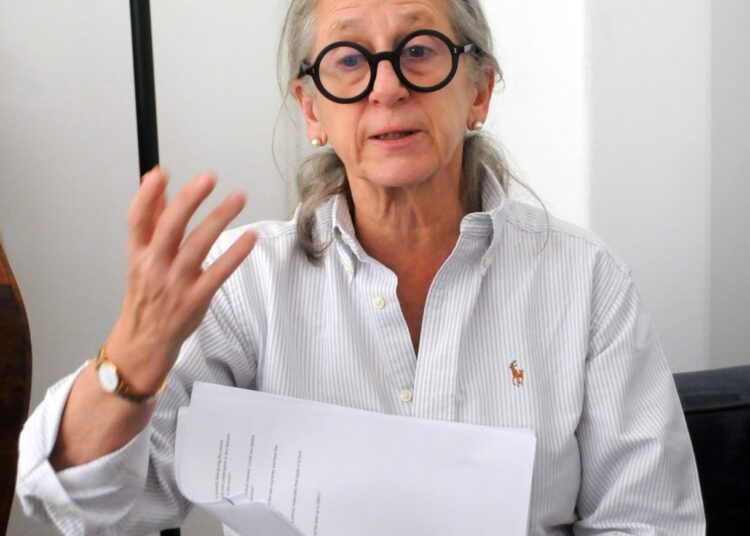Egypt is actively preparing for the United Nations climate conference, COP27, which will be held in Sharm el-Sheikh in November this year.
Portugal is also gearing up for another major UN event, namely the 2022 UN Ocean Conference which will take place by the end of this month.
On this occasion, the Egyptian Mail interviewed Portuguese Ambassadress to Cairo, Manuela Franco, to dig into the details of coordination between Cairo and Lisbon on climate issues as well as co-operation between them in other areas.

Ambassadress Franco said the Blue talks held by her embassy and the UN Ocean Conference, along with COP27, were different steps in the process.
“We are much mobilised to work on this as Portugal has a huge connection with the ocean,” the Portuguese diplomat said. “We are an Atlantic ocean country that historically lived in the ocean.”
The ocean has shaped the lives of the people of Portugal and the ways in which they relate to others.
Such a close connection with the ocean has manifested itself in Portuguese literary works.
For instance, Portuguese poet, Fernando Pessoa, praised the ocean.
“O salty sea,” he wrote. “So much of whose salt … Is Portugal’s tears! All the mothers … Who had to weep for us to cross you! … All the sons who prayed in vain! … All the brides-to-be who never … Married for you to be ours, O sea!”
Ambassadress Franco said fishermen represent a huge proportion of the people of Portugal, whose life is strongly connected with ocean.
Connection to biodiversity, she said, is very obvious.
“Definitely, there is a very important connection between climate change and the ocean and this needs to be reinforced in COP27,” Ambassadress Franco said. “In the upcoming ocean summit, we will take the UN agenda one step farther and then Egypt will take it one step farther in COP27.”
She said her country has been committed to the green transition for a long time now, with over 50% of energy produced in Portugal coming from renewable sources.
She added that the Portuguese government implemented these policies throughout Portugal.
For instance, there is a ban on the use of plastic bags in markets across Portugal.
These details, she said, reflect how Portugal is committed to protecting the environment from hazards.

Ambassadress Franco referred to some of the difficulties facing climate financing.
“Everybody is now committed to that,” she said. “We have to know that change is costly, not just for the mentalities, but also in real money from an economic perspective.”
She confirmed the presence of a political will on all sides towards this financing.
She described the Egyptian negotiating team as a very ‘competent’ and ‘experienced’ one, wishing the team good luck in the coming period.
In economic terms, Egypt and Portugal have balanced relations.
Ambassadress Franco said these relations should grow a lot in the coming period.
“We are promoting exchange in diverse areas,” she said.
The inventory of trade exchange between the two countries contains several items, including chemicals and leather.
Nonetheless, Ambassadress Franco said economic ties between the two countries need to expand in the future, citing the importance of these ties.
One of the key challenges, she said, is making countries better known to each other.
This is why a Portuguese delegation is expected to visit Egypt to participate in a major construction fair that will be held in Cairo later this month.
“Such an exchange of visits helps develop new areas for co-operation,” the Portuguese diplomat said.
Co-operation between the two countries is so diverse and covers a wide range of fields.
Egyptian Minister of Higher Education and Scientific Research, Khaled Abdel-Ghaffar, participated recently in the annual conference on science and technology in Portugal.
The minister’s participation in the conference, Ambassadress Franco said, opens new horizons for co-operation in these fields.
“Egypt’s participation was very well-received,” the ambassadress said. “Egypt was invited as guest of honour.”
The conference is held annually in Portugal and is usually opened by the prime minister who usually brings to the event with him most of the members of the Portuguese cabinet, reflecting how highly Lisbon views such science and technology gatherings.
The Portuguese president also usually attends the closing session of the conference.
“The great merit of these conferences is that people get to know counterparts,” Ambassadress Franco said. “There is joint interest in fostering co-operation.”
Ambassadress Franco underscored the importance of connecting universities with the private sector.
She revealed that a Portuguese university would open a campus in Egypt’s New Administrative Capital.
The university, she said, would offer degrees just, as if people study in Lisbon.
She added that the university would offer five engineering courses and a BA.
She noted that PhD and research teams would move from Portugal to Cairo to have qualified presence here.
“As diplomats, our job is to put people into contact to make sure that opportunities are there,” Ambassadress Franco said. “As an ambassadress, I work on developing better communication between diverse communities.”






Discussion about this post